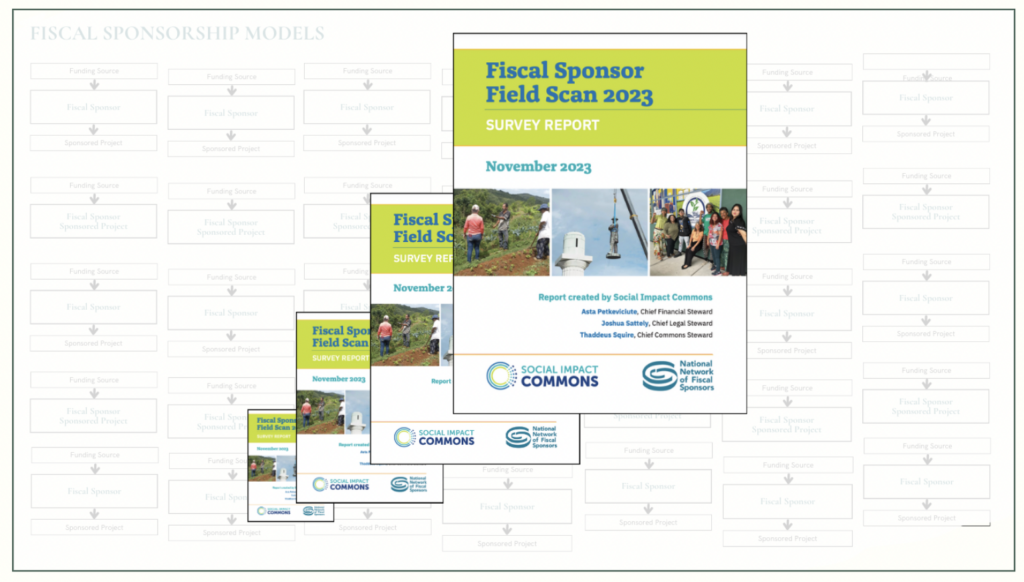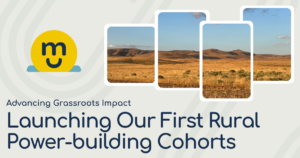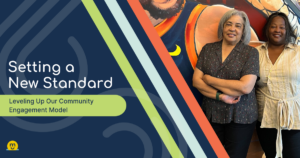Can a New Survey of Fiscal Sponsors Drive a Conversation on Commoning?
Thaddeus Squire wants to push the field of fiscal sponsorship in new, equitable directions.

This article is reposted from Proximate, our nonprofit media partner.
A new survey on fiscal sponsorship is the first of its kind in nearly twenty years. For one of its authors, the survey is also a first step towards a new vision of a more equitable model of intermediaries.
Fiscal sponsors are perhaps best known as a vessel for getting money to the grassroots, quickly. Fiscal sponsors “host” activities or groups of people who are doing charitable work, helping them take in grant dollars before they are legally incorporated – a process that can take several months or longer. Many fiscal sponsors also increasingly offer backend services for their “sponsored projects”, like tax and accounting.
Last month, Social Impact Commons and the National Network of Fiscal Sponsors released a landmark report on the state of fiscal sponsors in the United States – the first of its kind since 2006. The report found that the field of fiscal sponsorship is large and growing: the 100 organizations that responded collectively support more than 12,000 charitable projects and steward more than $3 billion in funding.
For Thaddeus Squire, an author of the report and founder of Social Impact Commons, the report is most noteworthy as a step toward a larger vision of a more all-encompassing and ambitious vision of fiscal sponsorship.
Squire believes that the traditional model of fiscal sponsorship is important, but limited. He is excited by fiscal sponsors who are doing more ambitious things. He wants to apply “commoning principles” to the more comprehensive model, to create a “management commons” – a shared capacity platform that relies on peer governance to offer more equitable, solidarity-oriented structures for stewarding nonprofit resources and amplifying their impact.
“We challenge the idea that independence of mission, vision, and agency requires independence of infrastructure,” Squire says. “Management commons can provide long-term homes for nonprofit programs, allowing for easier growth, contraction, pivoting, and ongoing re-invention.”
First, though, the field of fiscal sponsorship needs to define itself.
A Growing Field
Part of the reason fiscal sponsorship isn’t a larger part of the grassroots grantmaking conversation is because of the relevant lack of research like this recent scan.
The National Network of Fiscal Sponsors was the only support organization of its kind for years, until Social Impact Commons was founded in 2018. The two organizations have worked together to establish a stronger support system for fiscal sponsors nationwide, including a national gathering of sponsors that took place in New Orleans last week.
The scan was a big topic of conversation in New Orleans. It found that fiscal sponsors steward a tremendous amount of charitable work: the 100 organizations that responded collectively support more than 12,000 charitable projects, and steward over $2.6 billion in philanthropic funding for sponsored projects (as well as $575 million in government funding). They also make up an increasingly large part of the social sector workforce, employing or contracting with over 18,000 people.
The field is also growing rapidly. Nearly three-quarters of FSOs that responded were formed since 2000, with a sharp upward trend in new programs starting around 2010. This growth is driven in large part by an increase in locally-focused fiscal sponsors, which made up more than half of new programs.
“These figures are just a toe dipped in the water of the full fiscal sponsor ecosystem,” says Squire. He estimates that the scan represents ten percent of the total fiscal sponsor ecosystem in the country.
Some of the noteworthy data from the scan had to do with diversity. The scan found that leadership at fiscal sponsors exhibits significantly greater diversity than the nonprofit sector overall. Project directors at fiscal sponsors are 30 percent more likely to be BIPOC than project directors in the broader nonprofit field, while board members are 19 percent more likely to be BIPOC.
Similar rates of relative diversity were seen around gender, sexual orientation, and disability: for instance, project directors at fiscal sponsors are 21 percent more likely to be transgender.
But does that translate to more inclusive practices? The report found mixed results. They asked respondents a set of questions regarding DEIA practices, including whether the organization has long-term strategic goals around DEIA, or whether they disaggregate data. 58 percent said they rarely or never engage in these practices, while 42 percent said they do some or all of the time.
Equitable Intermediaries?
The field scan comes on the heels of a growing conversation around the need for investment in “equitable intermediaries”.
The conversation has been grounded by a series of revealing reports. One was the 2020 report Centering Equity in Intermediary Relationships, written by Change Elemental with support from the Ford Foundation.
The authors found that “despite intermediaries’ best efforts”, certain types of grassroots projects remain critically “underserved by the current intermediary field”. That includes projects with smaller budgets; projects that are geographically isolated; and projects that might be perceived as “riskier” to support due to the nature of their mission.
On the other hand, the authors found that very few fiscal sponsors provide services “explicitly grounded in equity” – and the few that do “experience such high demand” that they have little capacity to share their knowledge with peers.
Another report, published in November 2020 by The California Endowment, had the evocative title Philanthropic Intermediaries in This Moment of National Reckoning. The author interviewed several grassroots leaders who were critical of broken power dynamics between fiscal sponsors and their sponsored projects.
He made the case that the recent generation of BIPOC-led mutual aid groups and activist collectives are more likely to “[assert their] autonomy from traditional organizational structures”. He quoted grassroots leaders who were seeking fiscal sponsors that “share their critique of power, understand their communities’ needs, and have intersecting goals.”
The critiques have come with a specific vision for what a more equitable version of fiscal sponsorship could look like. The California Endowment’s report, for instance, calls for “a more ‘transformational’ model of capacity-building that is resonant with the cultural dynamics of grassroots organizations in communities of color.” That could look like less formal hierarchies, alternative financing models, deeper levels of back-office support, and a willingness to share political as well as financial risk.
Other recent reports, like the New Venture Fund’s Leveraging Fiscal Sponsorship for Racial Equity and TSNE’s Reimagining Fiscal Sponsorship in Service of Equity, share similar ideas.
What’s Next? Building a “Management Commons”
I spoke with Thaddeus Squire as he returned from the conference in New Orleans, where he says the field scan was well-received. Now he is focused on launching the next phase of Social Impact Commons’ work: a Research And Advocacy program that will work to push equitable intermediary concepts into the fiscal sponsorship mainstream.
As an immediate next step, Squire aims to continue to collect, organize and collate data on the sector, to provide a clearer picture of the field.
“This data doesn’t currently live with the IRS, or traditional accountability hubs like Candid or Charity Navigator,” he says. The best source of information is foundations themselves, which have large sets of data about where their money actually goes. “We feel philanthropy is going to be a big partner in building that warehouse of centralized data.”
But that work is in service of a larger vision. Squire is a student of commoning, an ancient concept that refers to practices of collaboration and sharing to meet the everyday needs of individuals and communities. “You can find it in cultures around the world; it’s one of the oldest ways that humans have organized themselves and managed resources,” Squire says. (He explores the topic in depth on his Substack).
While fiscal sponsorship is often seen as nothing more than a convenient way to get cash to grassroots groups quickly, Squire and others believe that the fiscal hosting structure can serve as the groundwork for an entirely new social sector ecosystem that is based around commoning principles.
To step back: fiscal sponsors typically use one of multiple “models”; the two most common are “Model C”, where the sponsor simply accepts grants on behalf of a project, and “Model A”, where the sponsor offers their projects much deeper backend support – up to and including shared finance, HR, legal, insurance, risk management, fundraising, capacity building and other resources.
The more services a “Model A” offers, the closer it gets to commoning principles. And shared services are only a starting point; the next step would involve peer governance of the fiscal sponsor organization, including decisions about how shared resources are stewarded and what projects get selected for hosting.
“When I look at what has been lifted up as equitable practice in the fiscal sponsorship community, I see many of those ideas and principles reflected in commoning practice,” Squire tells me. “If we can apply more commoning values and principles to the design and operation of fiscal sponsors, we will have more equitable and just fiscal sponsors as a result.”
Above all, Squire makes sure to talk about commoning as an active verb. “The sponsors that really cultivate that notion of mutuality and mutual care between the sponsor and the projects, and amongst each other, are much more successful and effective at weathering bumps in the road and working together.”




